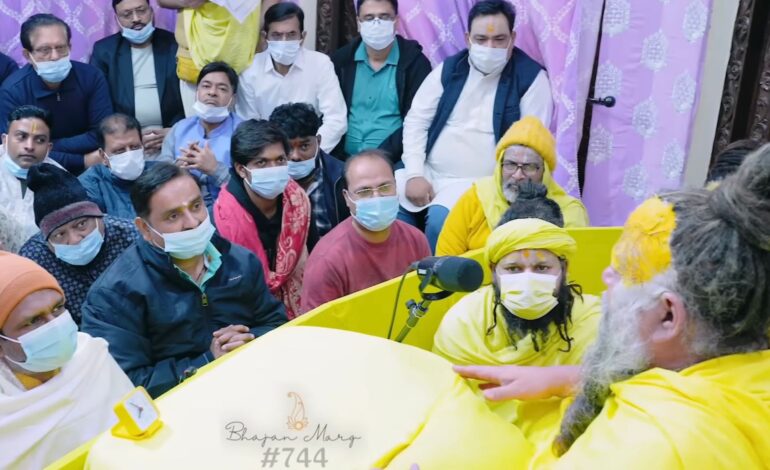
Exposing the Swami Premanand cult: A spiritual empire built on favoritism, deception, and exploitation
Swami Premanand Ji Maharaj, a self-proclaimed spiritual leader with a massive online following, has positioned himself as a beacon of equality, devotion, and enlightenment. His ashram, which claims to offer solace and spiritual guidance, draws thousands of devotees eager to experience his teachings. However, behind the polished image lies a disturbing reality of favoritism, exploitation, and a system that prioritizes celebrity status over spiritual equality. IndoUS Tribune’s investigation into the operations of the ashram exposes a culture of inefficiency and elitism that starkly contradicts the very values Swami Premanand preaches.
The Elusive Scheduling Process
Our journey began with multiple attempts to schedule a meeting with Swami Premanand Ji. We followed the official process, submitting numerous emails over several weeks, but received no response. Eventually, with the help of insiders, we secured a token for an EKANTIC session. However, this wasn’t without its hurdles. Devotees are required to arrive at the ashram as early as 4:00 AM to stand in line for limited tokens. The atmosphere was one of chaos and exhaustion as attendees were shuffled through a system that felt less spiritual and more bureaucratic.
EKANTIC: A Show of Favoritism
The EKANTIC session, meant to be a space for personal spiritual guidance, turned into a glaring display of favoritism. Devotees must submit their questions in advance, and only five or six are selected for the session. Our question was chosen as the second to be addressed. Yet, after answering the first question, the session took an unexpected turn. A family, accompanied by five or six individuals, was granted an exclusive audience with the Swami. The rest of the attendees were hurriedly ushered out, despite hours of waiting. This family was even presented with special saropas (scarves of honor), marking them as recipients of distinct privilege. When questioned about the preferential treatment, staff members responded aggressively. One retorted, “Do you even know who those people were?” Another compared the process to seeking an audience with high-ranking officials, stating: “Do you think you can just go meet the IG or DGP like that? You have to go through the process.” These comments, delivered with hostility, were disheartening for those seeking a spiritual connection.
A Day Wasted in Bureaucracy
The entire process consumed four plus hours, during which attendees were shuffled through four separate staging areas before being allowed into the EKANTIC session. The sense of regimentation was palpable, and the lack of transparency about how questions and audiences were prioritized left many attendees frustrated. At the end of the session, when concerns were raised about the inequitable treatment, staff members dismissed them outright. Some even suggested that dissatisfied attendees could wait another hour and a half outside in the line to ask their questions directly to a junior Swami. Such dismissive and combative responses from staff starkly contrasted with the ethos of compassion and equality Swami Premanand Ji Maharaj preaches.
A Militarized Atmosphere
The ashram’s atmosphere felt more like a military camp than a spiritual sanctuary. Attendees were expected to follow strict instructions without question and were denied the freedom to move or seek clarity on the process. This rigid structure and aggressive enforcement by staff left many feeling alienated rather than spiritually uplifted.
A Call for Accountability, Fairness, and Transparency
Swami Premanand Ji Maharaj’s teachings are undeniably influential, but the institutional failures at his ashram must be confronted. The ashram’s practices—marked by favoritism, inefficiency, staff hostility, and a militaristic atmosphere—are incompatible with the values of equality, compassion, and spiritual growth that the Swami espouses. This gap between the teachings and the practices undermines the credibility of the institution and the authenticity of its spiritual mission.
In addition to the organizational issues, the ashram imposes strict control over its attendees, prohibiting them from taking pictures and even confiscating their phones. This policy contrasts sharply with the Swami’s team of 3-4 cameramen, who are continuously taking photos and videos for the sole purpose of promoting the Swami’s brand on social media. Another group of 5-6 staff members is also tasked with circulating these videos, carefully curating content for further promotional purposes. This manipulation of media, under the guise of spiritual activities, raises significant ethical concerns about the ashram’s priorities and its true purpose.
It is clear that substantial reforms are needed. The ashram must eliminate its VIP culture, streamline its processes to prioritize accessibility and transparency, and ensure that staff members embody the principles of humility and respect. Additionally, there must be greater fairness in media representation, allowing for the participation of all attendees in a more open and genuine manner, rather than using them as mere props for promotional content. Only through such changes can the ashram begin to truly reflect the inclusive, compassionate spirituality that Swami Premanand Ji preaches. Until these issues are addressed, the ashram will continue to fail its devotees, leaving them disillusioned and spiritually alienated.